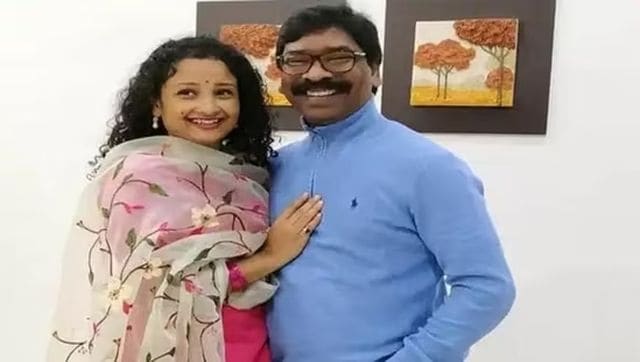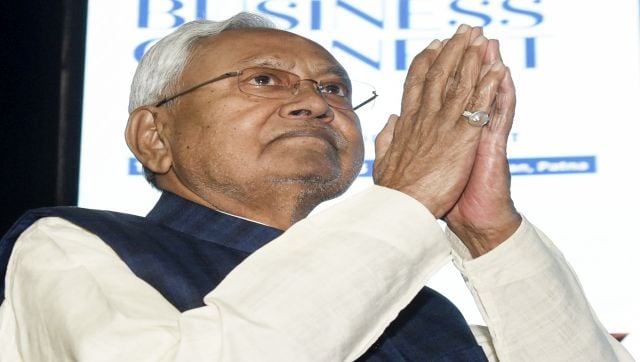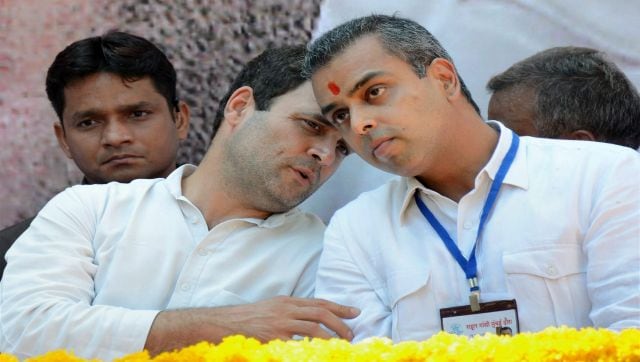The second identity of former president Pranab Mukherjee was that of a veteran, staunch Congressman, who had steered the party away from many a roadblock in his five-decade-long career.
He was christened the Congress' consensus-builder by the press. He was born in a family of staunch Congress-supporters and had himself been associated with the party since pre-Independence days; his daughter, Sharmishtha, is also a Congresswoman and the chief of Delhi Mahila Congress.
Yet, few would recall that there was once a time when the veteran leader had such a fall out with the party leadership that he was expelled from Congress and had later created his own party in West Bengal.
The 'fiasco' when Pranab quit Congress
Pranab was considered inseparable from Indira Gandhi. She was his political mentor and a leader under whose aegis Pranab climbed the ladder quickly. She launched him in parliamentary politics in 1969 by nominating him to the Rajya Sabha. Pranab in return went on to become her most trusted lieutenant. He stood by Indira through thick and thin: When Indira Gandhi rode to power after the Bangladesh Liberation war, when she imposed the emergency in 1976, and later too to share the blames of her actions. Pranab was one of the few people who stood by her when the Congress split in 1978.
But things started to change for Pranab, arguably since the day Indira was assassinated. There are many accounts of what transpired between Rajiv Gandhi and Pranab that lead the latter to a point where he was first dropped from the Union cabinet, lost what had become his permanent seat at the Congress Working Committee, and was later shown the door.
One part of the story goes where Pranab had allegedly aired his ambitions to become prime minister in front of Rajiv. On 31 October 1984, the day Indira was assassinated, Pranab and Rajiv were campaigning together in West Bengal. The grim news reached them and they immediately headed back to Delhi on a flight together. As per one version, also quoted in Livemint, Pranab, in a discussion on Indira's likely successor had suggested that the senior-most minister in the cabinet should become caretaker prime minister — a suggestion Rajiv's inner coterie felt showed his own interest in the chair as he was the sitting finance minister at the time.
Both Rajiv and Pranab, in subsequent interactions with the media, denied having the said discussion onboard that flight. Rajiv in an interview to India Today's TN Ninan denied having ever discussed the succession "with any of them" on the flight from Kolkata. Meanwhile, Pranab said he was among the people who stood beside Rajiv and even supported his appointment as the prime minister.
According to Pranab's own account in his memoir The Turbulent Years: 1980-96, he was 'shell-shocked and flabbergasted' when Rajiv denied him a berth in his Cabinet.
As per excerpts of the book published in Hindustan Times: "On the morning of 31 December 1984, Rajiv was elected as leader of the CPP at 11 am in a meeting held in the Central Hall of Parliament. l chaired the meeting and stood next to him when he announced to the media that the swearing-in would be held at 3 p.m. Even then I was clueless about the manner in which the day would unfold. I kept waiting for the call. Being dropped from Rajiv’s Cabinet was not even peripherally in my mind. I had heard no rumours, nor had anyone in the party ever vaguely hinted at it."
The former president presented a detailed and candid account of the one-and-half after Indira's death, leading up to his expulsion, in his memoir. He hinted at 'Rajiv's friends' working against him, owned up to his own actions that he said could have been misread, and also admitted that his proximity to Kamalapati Tripathi (a known dissident and critic of Rajiv's policies) could have been misconstrued as rebellion. But he ultimately insisted that all his actions were without malice or ill-intent towards Rajiv.
Although he claimed he remained 'composed' and 'unruffled', the pain he felt at the gradual sidelining in his own party is expressed in his book.
"...To my utter shock and dismay, I was dropped from the CWC when it was reconstituted in January 1986. This was a blow which hurt even more than being dropped from the Cabinet. As a Congressman, I had always considered membership of the CWC as the highest recognition possible within the party. I had held that post uninterruptedly since 1978. I was also dropped from the CPB, the very body to which PV Narasimha Rao and I had recommended that Rajiv (as leader of the CPP) be invited by the President to form the government. However, this was to be anticipated, as the CPB is a sub-committee of the CWC."
Later he was summarily shown the door by Rajiv, the severance of ties unexpected and unceremonious.
"On 26 April 1986, I was at Kamalapati Tripathi’s residence when his daughter-in-law, Chandra, brought me the shocking news that I had been expelled from the party for six years. She had heard it as a newsflash. No one from the party leadership had bothered to inform me. Even so, I remained unruffled."
The last straw for Pranab was perhaps an interview given to Pritish Nandy of The Illustrated Weekly of India that journalists covering events at the time called "provocative", but Pranab deemed "mischievous".
In journalist Prabhu Chawla's words: "Indeed, they (dissidents ousted at the time including Pranab) may have underestimated Rajiv, whose government Pranab had termed weak and blundering in a provocative interview to The Illustrated Weekly of India. These remarks hardly called for such a harsh action against Mukherjee... The octogenarian (Kamalapati) Tripathi was similarly immobilised, pleading for time till he read the next day's newspapers before he reacted. He could hardly have been happy with the fact that the news of the action was brought to him by daughter-in-law Chandra even as he discussed strategy with Rajiv's targets."
After his dismissal, in 1986, Mukherjee founded another party, the Rashtriya Samajwadi Congress (RSC), in West Bengal. However, he agreed to merge the RSC with INC three years later after facing a poll fiasco and reaching a compromise with Rajiv.
In Rajiv’s own words, the reconciliation happened when he realised that "many things told to him about his mother’s trusted men, such as Mukherjee and RK Dhawan, were untrue."
But although he was welcomed back into the party folds, Pranab's true rehabilitation into the Congress could only happen after Rajiv's assassination. Rao became the prime minister in 1991 and appointed Pranab as deputy chairman of the Planning Commission and subsequently as a Union cabinet minister.
In retrospect, however, at age 81, Pranab saw both Rajiv and himself in kinder light as he documented the whole episode in his memoir.
"To return to the question of why he dropped me from the Cabinet and expelled me from the party, all I can say is that he made mistakes and so did I. He let others influence him and listened to their calumnies against me. I let my frustration overtake my patience."
He even admitted that forming his own party was a mistake, a 'fiasco'
"I have candidly recognised in the book that I should not have ventured into this (forming a separate party) because I was never a mass leader and I did not have the type of following which rebels from Congress like Ajay Mukherjee in 1960s or recently Mamata and in one sense Indira ji herself had," Mukherjee was quoted as saying by The Economic Times.
The rise of Pranab Mukherjee
For someone who had such a fall out with Rajiv, Pranab's second-stint in Congress could have been short-lived given the fact that the former's widow (Sonia Gandhi) went on to assume full and total control of the party, and became its longest-serving president.
But Pranab's political fate only goes on to show what an astute politician he was. He did not let the animosity between him and Rajiv rub off on Sonia from the moment she assumed control. Perhaps the taste of defeat in the wake of RSC's poll debacle almost a decade ago was still fresh in Pranab's mind. Or, like he admitted in his memoir later, he had understood that he will never be the mass leader with a popular appeal -- something that members of the Nehru-Gandhi clan seemed to command naturally. Whatever may have guided Pranab's actions, but he reportedly went out of his way to build bridges with Sonia.
According to an article in The Indian Express, Pranab was one of the strongest architects of her ascendancy to the post of party president. "It is believed that Mukherjee played a key role in educating Sonia, mentoring her to tackle situations the way her mother-in-law had once done," the article said.
But despite Pranab's best efforts, he never could completely defeat the undercurrent of mistrust. He was the soldier that the Congress needed and hence could not dismiss. But the shadow of his so-called past ambition remained overcast on his political career.
Thus Pranab lost another chance to become the Prime Minister of India.
When Sonia, dogged by a campaign against her foreign origin, declined the prime ministership in 2004, there were rumblings that Pranab could be the party's pick given his vast experience in governance and in Parliament. Pranab, too, had come to anticipate the same.
"The prevalent expectation was that I would be the next choice for prime minister after Sonia Gandhi declined. This expectation was possibly based on the fact that I had extensive experience in government, while Singh’s vast experience was as a civil servant with five years as a reformist finance minister," he wrote in his book The Coalition Years (1996-2012).
But history, as we know, had other things for him in store and Pranab lost out that battle to Manmohan Singh.
According to an article in The Week, , while Sonia has always been 'held responsible' for preferring Manmohan over Pranab, sources close to Pranab revealed that it was actually Rahul Gandhi who had openly batted for Manmohan. Pranab, instead, was destined to continue to remain the number 2 in the government.
Another report in Livemint details how the pall of Pranab's 'ambitions' troubled him in his ministerial years in the UPA government even as he became the party's go-to man to navigate complex manoeuvres of alliance politics.
"Close aides claim that Mukherjee believed he never really had the full trust of the prime minister (Manmohan); and neither Mukherjee nor other senior cabinet ministers such as the late Arjun Singh readily accepted Manmohan's authority, especially in cabinet meetings, despite Sonia Gandhi’s attempts to make sure the Prime Minister received due respect."
But these 'setbacks' never held back the master politician.
He remained cordial with Rahul despite an earlier rebuff, and Manmohan despite their obvious differences. This was remarkable for someone who held a reputation for his short temper.
Eventually, that patience paid off as after more than four decades of active work in the Indian political landscape, he was elected as the 13th President of the country in 2012.
September 01, 2020 at 08:46AM









No comments:
Post a Comment